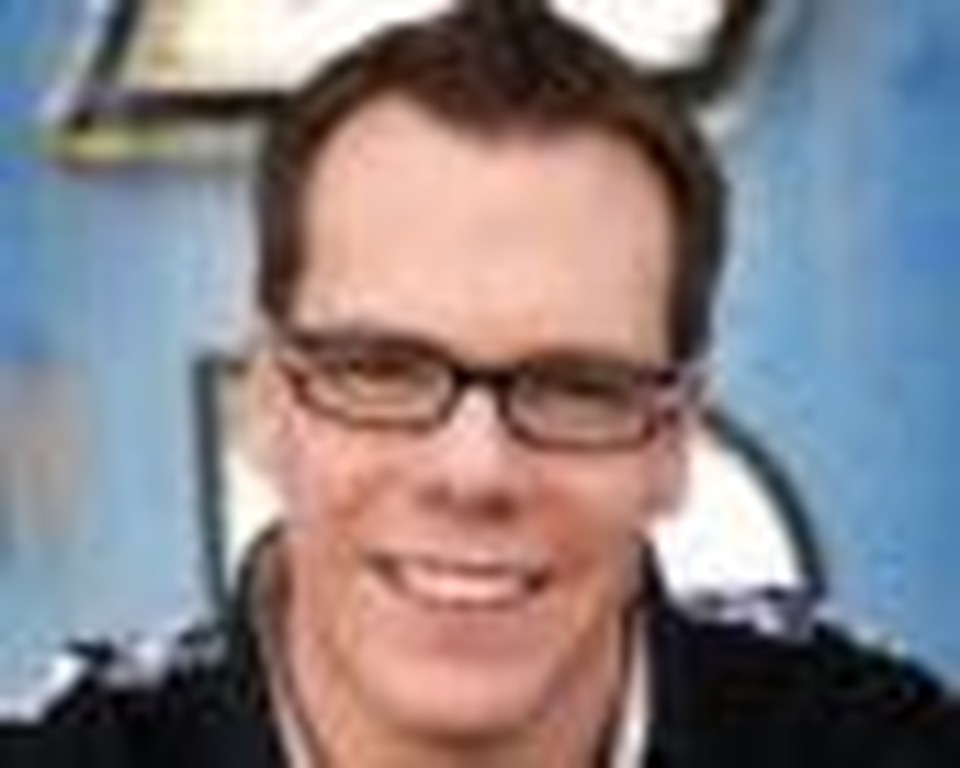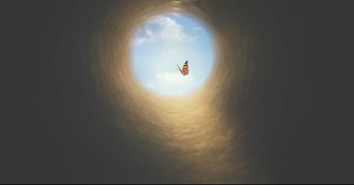Preaching in Vegas: An Interview with Jud Wilhite

Preaching: Eyes Wide Open is an intriguing title for a book. Where did that come from?
Wilhite: I think the title is anchored in Ephesians 1, where Paul says we have every spiritual blessing in Christ, that we've been chosen to be holy and blameless in His eyes, in God's eyes. And so the question of the book is: What does it mean to live our lives, seeing ourselves as God sees us, surrendering our view of ourselves and embracing God's view of us, and just finding the freedom and the empowerment to be used to the greatest ability God could use us?
Preaching: You talk about having our eyes wide open to God, to our own identities, to change and to influence. What are the areas where you think a pastor would find some help and some benefit in this book?
Wilhite: As pastors we all work with so many people who are broken and hurting. We see it all around us. Certainly in Las Vegas it's kind of ground zero for whatever's happened in our culture. So many people are hurting; they have such a distorted
perception of themselves and of God, of who He is, His love, His sovereignty, His power.
I thought if I had one opportunity to write a book for someone after he or she has become a Christian and is beginning the spiritual journey, what would it be? And that's what became Eyes Wide Open. If I could [I wanted to] cut 10 to 15 years out of some of the pain and frustration in my own life that I experienced by just laying a resource in front of them that would help them see God clearly as a God who loves them, who cares for them—to see Christ and His grace clearly and to understand how His spirit can come into our lives.
Then [I wanted to] help them move to see their identity as the Bible describes it, that they're saints, they're priests, they're servants—all of these things are the realities of what they experience in Christ—and then challenge them to move out into their culture, out of this new identity, out of this love of God, and make a difference. My ultimate goal is to be a resource for someone starting that spiritual journey and to say: "Listen, God has a unique identity and perspective of you; and when you see it, when you embrace it, it will just set you on fire to make a difference in the lives of others and make a change in your own life."
Preaching: You talk in the book about change. How do you address that issue?
Wilhite: A lot of people say, "How can you be a pastor in Las Vegas? Doesn't it just drive you crazy? All the sin, all the billboards, all the sexual promiscuity kind of right out in front of you?" I think it probably would if I thought behavior was the issue; but I think in most of our lives, it's belief that is the core issue—our belief about God and about one's self—and behavior follows out of that.
And so what I try to do in the book is set up what it means to have a biblical view of God. What does it mean to have a biblical view of our identity in Christ? Then out of that belief, as we change that belief, now how does that begin to change our behavior as well? So I think behavior follows belief, and first you've got to deal with the belief side.
But when it comes to change, I see change not in growth—not so much like this sort of continual incline where we're getting more like God, and more like Christ, and we're just going up the mountain. I see it like a spiral. Remember a spiral-bound notebook? You start on the journey and you have high moments and low moments. You have moments where you're making great progress personally and you're experiencing change, then moments where it feels like you're back down at the bottom and you wonder
what happened. But all of it is on a spiral, moving toward a destination. And we're moving toward this destination of
becoming like Christ, but we have our highs and our lows.
That's just the normative spiritual experience with ups and downs. What I try to do is talk about how we can keep moving in that spiral as we become more like Christ.
Preaching: I think most pastors can definitely relate to that whole idea of the highs and lows.
Wilhite: Oh yeah. Its either Monday or Saturday night, you know? If the sermon isn't going well, Saturday night's bad. And no matter how it goes, Monday's usually tough ...
Preaching: On Monday no pastor should be allowed anywhere near a knife or a computer to type a resignation letter!
Wilhite: (Laughs) Oh, that's right, that's right! You hear that, and it's cliché and we laugh; but when you're in it ... Isn't it amazing how we all wrestle with the reality of how our emotions just go up and down? Every pastor's got his Monday daydream, right? Mine for a long time was like a Starbucks, where I can just take your coffee order, make it, and then give it to you and we're done. You're going out the door, and we'll move on to the next one.
Preaching: Where life is simple.
Wilhite: Yeah.
Preaching: You had an amazing Sunday recently related to baptism.
Wilhite: We really did. The year 2008 for us in the Las Vegas valley was a good year. But I felt like with all the things going on in the economy, with all the things happening culturally, it didn't feel like our city was really reaching out to God like I would've thought it should. It just felt like people were holding back. I didn't really understand it.
And then 2009 came. It's not just our church—I've talked to pastors of many churches around the nation who have seen this in different pockets—but boy it seems like in 2009, it finally let loose. People just started returning to church, opening their hearts to God, searching again; realizing that with all the stuff we're going through, there is no temporal, earthly solution for this. So we've seen a great spiritual harvest in the Winter-Spring of '09.
To culminate that, I realized we've had so many people taking steps of faith—more than I've ever seen in my 15 years of ministry—and I just felt like we needed a weekend where we helped these people take a next step of baptism. So we did a message on baptism, and we actually ended the service about 20 minutes early. We did a 40-minute service, pretty much did a couple songs, then I got up and taught about baptism. We handed people black plastic bags to put in their cars—they were going to be wet because I was challenging them to get baptized in their clothes right then. And we had some pools outside. I just went down a whole list of people's excuses, tried to remove those excuses, and we saw well over 1,200 adults get baptized that weekend.
It was unbelievable. The message was not highly motivational. It was pretty matter-of-fact. I had them come down front and led them in a confession of faith, then we exited out to be baptized. We did one more song in the church while they all got ready, and then the whole church exited out together around these baptismal pools to see it happen.
To see the people—I mean, big, burly biker guys, guys you wouldn't want to meet in the alley at night; tough guys coming down front, tears in their eyes—it was truly just a move of God's Spirit. There's nothing else I could attribute it to. And the change has just continued on in a really significant way over the last month.
Preaching: If we were to come and visit your church on a typical Sunday, what it would be like?
Wilhite: I think you'd walk in and find it very friendly, very eclectic, very demographically diverse—from young adults to seniors—very racially diverse. Our largest population would be Caucasian, but then Hispanic, African-American. That is a picture of Las Vegas. You'd hear a great band, great music, very culturally kind of tuned-in; but you'd also, I hope, walk away feeling like you had heard the Word of God taught clearly and with passion, that the Bible was clearly the source and the guide for everything that this church does. And I would hope you'd walk away and feel that we're not compromising in any way the core message and the core teaching. We're actually contending for the faith once for all entrusted to God's holy people.
Preaching: Well, tell me about your approach to preaching.
Wilhite: I preach in series, usually three to six weeks long. The longer I've been in the Las Vegas valley, the more aware I've become of the absolute biblical illiteracy that exists in our culture and certainly in our area. I will almost always teach
exegetically from one passage of the Bible. Our people don't have the ability, the tools, many of them, to turn here and turn over there; so I work really hard to kind of anchor into one scriptural passage, have everybody turn to one place in their Bibles and stay there. And that's become a huge value for me.
If you rewound the clock five years, I was way more topically oriented. I was kind of all over the map, and it hit me one day that so many of our people are coming to faith. Las Vegas is a very transient community. Many of them will move on. If I don't at least get them familiar with their Bibles, help them bring their Bibles, open their Bibles up, learn to not be afraid of it, learn to look at a passage and understand what it means, then I have really failed them as a pastor.
We're doing a series right now called "Torn—Of Pain, Suffering and God" and it's a four-week series through the Book of Job. It's been a fantastic experience. It's like every weekend is really heavy, definitely dealing with pain and those sorts of core issues. The Book of Job is so rich and so challenging at the same time because Job doesn't ever really answer the question of suffering. It just upholds the question—that God is sovereign and that He's good and that we suffer. Just going through the text though, and letting the Bible speak; and trying to apply it to people's lives has been so much fun.
That's where I feel like, more and more, my teaching and my preaching is going. I'm less concerned about being creative even though I'm in a highly creative church. Less concerned about people walking away saying, "Man, that was an amazing speaker." I'm way more passionate and concerned about them saying, "We have an amazing God; and that was amazing what He communicated in His Word, and I want to get to know Him more."
Preaching: Most of us that don't live in the Vegas area would think of that as an overwhelmingly secular environment. Do you find yourself taking a different approach in your preaching, given that environment, as compared to being in another area of the country?
Wilhite: Absolutely. Everything's got to be explained. Absolutely nothing can be assumed every weekend. And that's a challenge because even our basic language that we use as Christians has to be clarified.
I'll never forget—I did this message, and I had a glass mirror and wrote on the mirror. It was a message based on the book Eyes Wide Open. And so I wrote on the mirror all the things that we see when we look in the mirror—failure, unworthy, unloved—whatever it may be. I went down a whole lot of different perspectives people have. And the whole message was about seeing ourselves as God sees us.
So at the end of the message I smashed this mirror, and behind the mirror is the word grace on the mirror—it was a double mirror. So the mirror behind it is the reveal, and it says grace. So when you look in the mirror, you see God's grace, see His mercy, see His forgiveness.
And I had a guy come up to me after service. He says, "That was so great, that was powerful. I just have one question: What is grace?" Even words like grace, you just assume after awhile; and I slip into it.
I still have to fight it. So everything has to be explained.
At the same time I do feel like the more you challenge people, and the more honest you are about the Bible being your guide and teaching the Bible authentically, you don't have to compromise. You don't have to cut all the corners on it. You don't have to answer all the questions. You don't have to dumb it down and make it easy. You can explain it in everyday language, but you can explain it in such a way that it doesn't dumb it down; and you can challenge people with it. I think the more people are challenged, the more we're seeing people respond and step up and follow that kind of leadership in their life.
Preaching: What do you love most about preaching in the church where you are now?
Wilhite: One of the dynamics that I appreciate about this specific church is there really isn't much of a pallet for Christianity or for the faith, so they truly are looking to me to paint that picture for them. We get to start at ground zero with people in their spiritual journey. There are challenges to that. It's very messy because it takes years to develop spiritually mature people. I definitely feel like we've got a church filled with people just beginning their spiritual journey over the last few years.
So that's a challenge, but it's also a lot of fun because you feel like you're empowered to make disciples and to have a real input in how those disciples are made. You're not inheriting everybody else's perceptions and baggage and problems and issues as much as you're creating your own now. And my whole thing has been, point them to the Word of God. Point them to the Bible as the Word of God. Teach it consistently and authentically. Teach it according to historic Christianity. And let God's Word not come back void.
Just don't underestimate how broken people are who you're going to be working with. I pastored in Texas for many years; and you see people come in, and they have their suits and their ties in that culture. They maybe put a little more pretty face on it, and church is a little more a part of the culture there. But don't underestimate how broken that family or that individual may really be beneath the veneer.
The benefit I get in Las Vegas is there's no veneer. They just walk right in, and there it is. So my challenge there would be: Speak to the broken, and you'll always have an audience.
Originally published September 24, 2009.





